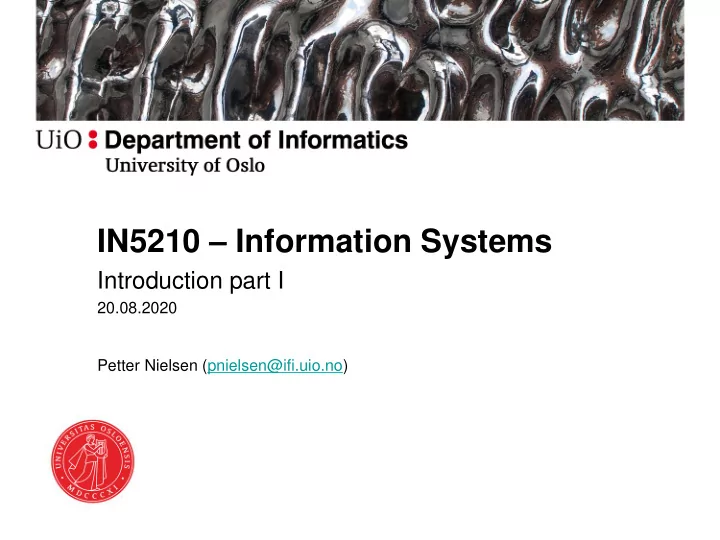

IN5210 – Information Systems Introduction part I 20.08.2020 Petter Nielsen (pnielsen@ifi.uio.no)
Agenda 1. Welcome 2. Introduction to the course – Motivation – Structure 3. Expectations 4. A very short introduction to Information Systems 5. Part II: Introduction to seminars
1. Welcome
Who am I? • Associate Professor in the Information Systems research group – Responsible for IN5210 – Supervise Master and PhD-students – Part of the management team at IFI • Research interests – Software platforms and ecosystems – Digital Global Public Goods – Health Information Systems in Developing Countries/DHIS2/HISP • PhD from IFI (2006) • Hovedfag in Systemarbeid from IFI (1999) https://www.mn.uio.no/ifi/english/people/aca/pnielsen/index.html https://www.researchgate.net/profile/Petter_Nielsen
Coronavirus • In general: Wash your hands frequently, keep distance and stay home if you have symptoms • For IN5210: Digital lectures and normal seminars
2. Introduction to the course
Motivation • Introduce Information Systems Research and Practice broadly • Prepare you for master thesis work – Know as selection of Information Systems theories and concepts • How to identify them • How they are made • How to use them in own research – Practice reading academic papers – Practice academic writing
Motivation cont. • Reflecting the research focus in the Information Systems and the Digitization and Entrepreneurship research groups – many ‘guest lecturers’ • Warning: Lectures will appear as fragmented – Reflects our research groups – Reflects the information systems research field • Fragments may be relevant for your thesis! – To learn to know potential supervisors – To use in your thesis • A different approach: Management Information Systems: Managing the Digital Firm, Laudon & Laudon (http://dinus.ac.id/repository/docs/ajar/MIS_KC_Laudon.pdf)
Structure • 2+2 hours of lectures per week – Not two lectures every week – the schedule is not yet finalized (but almost there) • 2 hours seminar per week – Alexander will say more – Mandatory (80%), including preparation (submission of a short summary/reflection document prior to each seminar)
Structure cont. • Lectures – Recorded (at least most of them) – There will be a ‘live’ question and answer session for each lecture as scheduled – So, for the ‘live’ lectures you are expected to have watched the recording and be ready with your questions
Stay informed • Use the course website – Schedule – Curriculum – Messages • Read your IFI email
Exam • Essay (written home exam) • The mandatory assignments must be approved prior to the exam • Graded A-F • 3 weeks, 3-4 days work expected • Tentatively: November 10 to November 30
3. Expectations
Learning outcomes • Have insights in information systems practices in organizations, and can relate these to complexity and organizational change • Have an understanding of core concepts, models and approaches of information systems development • Have an understanding of the socio-technical and complex nature of information systems • Are knowledgeable of contemporary debates in information systems research • Can review academic literature to identify relevant theories and concepts and use them to analyze and discuss empirical data • Have an understanding of the role of theory in guiding research and as outcome of research
My expectations to you • Watch the lectures • Ask questions and engage the lecturers in discussions • Read prior to the seminars • Come to the seminars • Engage actively in the seminar discussions • Form groups and work on your own • Identify interesting research areas, research topics, theories, concepts as well as potential supervisors
4. A very short Introduction to Information Systems
What is an Information System? • “An information system ( IS ) is an organized system for the collection, organization, storage and communication of information. More specifically, it is the study of complementary networks that people and organizations use to collect, filter, process, create and distribute data.” (Wikipedia) • Phenomenon/subject matter – Observable – Designed, implemented and used • And a research field
Another definition of Information Systems • «… a set of entities, shared patterns, and information processing capabilities that support goal attainment.» (Watson, 2014, p. 520) – Entities: people, groups of people and organizations – Common language and protocols for communication – Capabilities like brains, but increasingly computers – For a purpose (utilitarian or hedonic) • Better information systems, better – prepared to attain goals, – collaborate, – and transformative capacity • Not only technology: Socio-technical
Scope of Information Systems research • Started within the organization (accounting) • Today: broader • Driving forces behind this change: – Digitalization in all aspects of life – Distribution and interconnection – Scale and capacity of computers (Sørensen 2016)
Other issues • A peak at the webpage of the course (IN5210) • Also watch the introduction to the seminars • Join the Q&A session! • References: – Sørensen, C. (2016). "The Curse of the Smart Machine? Digitalisation and the children of the mainframe," Scandinavian Journal of Information Systems. 28 (2), pp. 57-68. – Watson, R. T. (2014). “A Personal Perspective on a Conceptual Foundation of Information Systems”, Journal of the Association for Information Systems, 15 (8), pp. 514-535.
Takk!
Recommend
More recommend